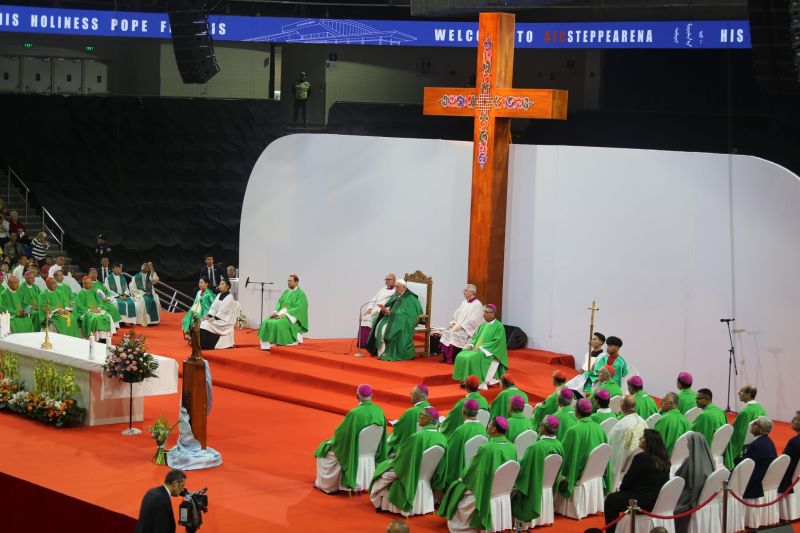 Pope Francis presides over the first-ever papal Mass on Mongolian soil in Ulaanbaatar’s Steppe Arena on Sept. 3, 2023. / Andrea Gagliarducci/EWTN
Pope Francis presides over the first-ever papal Mass on Mongolian soil in Ulaanbaatar’s Steppe Arena on Sept. 3, 2023. / Andrea Gagliarducci/EWTN
Ulaanbaatar, Mongolia, Sep 3, 2023 / 03:30 am (CNA).
Catholics from across Asia traveled to Mongolia to attend the country’s first-ever papal Mass with Pope Francis on Sunday.
“For people in Asia … we do not have a lot of opportunities to meet the pope personally, so for many of us, for most of us, this is a once-in-a-lifetime opportunity and it is like a dream come true for many many Asians,” Hee Jung Choi from Seoul told CNA at the Mass on Sept. 3.
While papal Masses on the pope’s other international trips can draw hundreds of thousands of people, the Mass in the Mongolian capital of Ulaanbaatar only had an estimated 2,500 in attendance — presenting a rare opportunity to personally meet the pope for many attendees.
“We came to Mongolia to ask the pope to visit Vietnam,” Father Huynh The Vinh of the Vietnamese diocese of Phu Cuong said.
Huynh is one of 90 Vietnamese Catholics who made the journey to Mongolia to see the pope, along with seven bishops from the country.
Catholics from South Korea, Vietnam, the Philippines, Russia, China, Hong Kong, Thailand, Kazakhstan, Kyrgyzstan, and Azerbaijan attended the Mass in the sports arena, according to the Vatican. The visiting Catholics nearly doubled Mongolia’s small Catholic population of 1,450 people.
Among the crowd were Catholics from mainland China, who risked retribution from their government to attend the Mass with the pope. At the end of the Mass, Pope Francis called Cardinal-elect Stephen Chow, the bishop of Hong Kong, and Cardinal John Tong Hon, Hong Kong’s bishop emeritus, to his side as he shared a special message to Chinese Catholics.
Pope Francis added that he wanted to “send a warm greeting to the noble Chinese people.”
“I ask Chinese Catholics to be good Christians and good citizens,” he said.
Pope Francis arrived in the Steppe Arena to enthusiastic cheers of “Viva Papa!” as he made his way around the arena in a small golf cart, stopping to kiss babies and shake hands.
In his homily, reflected on the words of Psalm 63, “my soul thirsts for you,” — words that he said accompany “our journey through life, amid all the deserts we are called to traverse.”
Pope Francis said that the words of the psalmist, who laments the thirst of his soul as if in a “dry and weary land,” have “particular resonance in a land like Mongolia: immense, rich in history and culture, yet also marked by the aridity of the steppes and the desert.”
The Gobi Desert, the sixth largest in the world, stretches across the bottom third of Mongolia. It has an extremely harsh climate with temperatures that can range from 113°F to -40°F.
Speaking in a place steeped in a nomadic tradition, Pope Francis said: “All of us are ‘God’s nomads, pilgrims in search of happiness, wayfarers thirsting for love. The desert of which the Psalmist speaks, then, is our life.”
“Many of you know both the satisfaction and the fatigue of journeying, which evokes a fundamental aspect of biblical spirituality represented by Abraham and, in a broader sense, by the people of Israel and indeed every disciple of the Lord,” the pope said.
Over the last half-century, as many as one-third of Mongolia’s people have left the countryside, where they lived as nomadic herders, to live in the capital Ulaanbaatar. With around 3.3 million people, Mongolia remains one of the most sparsely populated countries in the world.
In a country so familiar with the hardships of long journeys, the pope told the crowd that the Christian faith is “the answer to our thirst.”
“We thirst for love, for only love can truly satisfy us, bring us fulfillment, inspire inner assurance, and allow us to savor the beauty of life,” he said.
“Dear brothers and sisters, the Christian faith is the answer to this thirst; it takes it seriously, without dismissing it or trying to replace it with tranquilizers or surrogates. For in this thirst lies the great mystery of our humanity: it opens our hearts to the living God, the God of love, who comes to meet us and to make us his children, brothers and sisters to one another.”
Quoting Saint Augustine’s “On the Psalms,” Pope Francis said: “‘Lest we grow faint in this desert, God refreshes us with the dew of his word… True, he makes us feel thirst, but then comes to satisfy that thirst… God has been merciful to us; he has opened for us a highway in the desert: our Lord Jesus Christ.”
“‘He has offered us a source of consolation in that desert: the preachers of his word. He has offered us water in that desert, by filling those preachers with the Holy Spirit, so as to create, in them, a fount of water springing up to life everlasting.’”
Catholics prayed in Chinese and Russian during the prayers of the faithful after the pope’s homily. Cardinal Giorgio Marengo, the apostolic prefect of Ulaanbaatar and the world’s youngest cardinal, served as the main celebrant of the Mass.
“At the heart of Christianity is an amazing and extraordinary message. If you lose your life, if you make it a generous offering, if you risk it by choosing to love, if you make it a free gift for others, then it will return to you in abundance, and you will be overwhelmed by endless joy, peace of heart, and inner strength and support,” Pope Francis said.
“[W]hen we lose our lives for the sake of the Gospel, the Lord gives them back to us abundantly, in the fullness of love and joy for all eternity,” he said.
[…]





